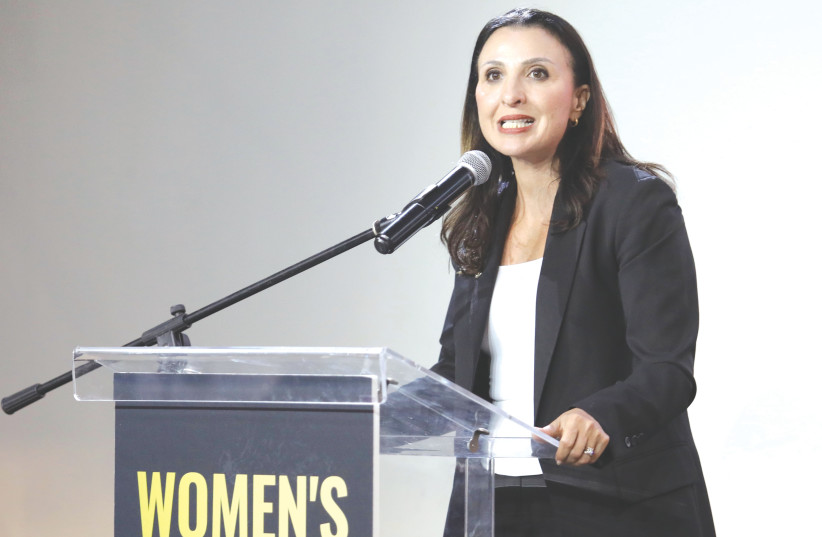Since October 7, Deputy Mayor Fleur Hassan-Nahoum has become one of the clearest and most incisive voices in Israeli advocacy to the English-speaking world.
Recently, at her home in the capital’s Baka neighborhood, Hassan-Nahoum spoke to In Jerusalem about her experiences since the first day of the Swords of Iron war as an in-demand commentator on television and radio channels in Britain and the US, in the face of the deluge of false news and the accusations by anti-Israeli and antisemitic circles regarding Israeli military action in Gaza.
“For the last seven years, I have been the spokesperson for Jerusalem in the media, so every time there’s a problem – the Temple Mount, the month of Ramadan, rockets toward Jerusalem, and so on – it’s always been me in front of the cameras. So a lot of these news channels know me. But then it was Shabbat morning, I was alone at home while my husband was in hospital with his father – who passed away a few days later – and we had five sirens one after the other.
“I am shomer Shabbat, but it sounded so alarming that I switched on my phone to see what was going on, and I saw the messages from the people on the kibbutzim, I saw what was happening in real time… and then I saw missed calls from the BBC, trying to reach me again and again and again, and from Sky News and more.”
Hassan-Nahoum says they called her because apparently, no one else was answering.

Fighting without a gun in the battle for Israeli public diplomacy
“At that point, I thought to myself: ‘This is why I am here. I don’t have a gun, but I am a soldier of public diplomacy.’ I was recently appointed by [Foreign] Minister Eli Cohen as special envoy for innovation. It was going to be my next job, since I am not running to the Jerusalem Council again, so I thought: ‘This is my moment.’ And from that Shabbat morning until today, I have not stopped doing hasbara for the State of Israel in English, as well as in Spanish.”
She says that she is the only one doing hasbara in Spanish.
“I knew from the very beginning that at the most, we were going to get two to three days of mercy from the international community due to the massacres. In actual fact, we hadn’t even started a counter-offensive and we were already told that we were wrong to react, and I knew that we had a ticking clock over our heads.”
However, even in the very first days, she says, a Sky News interviewer asked her: “What did you expect?”
“I answered ‘Expect what? Don’t you know that we haven’t been inside Gaza since 2005?’”
Hassan-Nahoum adds that she rapidly realized that even journalists don’t know the facts, “also because the Palestinians have done such a good job of talking about an occupation, that even though we have not been occupying Gaza for 18 years, the narrative of the ‘occupation’ is even inside educated people’s heads. And hence I spent hours and hours educating people about what really happened and the real situation on the ground.”
Asked about the major issues she had to face in those interviews, Hassan-Nahoum says that the victimhood of the Palestinians has been so ingrained in the consciousness of the Western world, and especially the US, where everything is about the oppressor and the oppressed – and, of course, Israel can never be seen as “oppressed.”
“That picture of victimhood for Israelis is a very difficult sale because we don’t want to see ourselves as victims, even though we are. Because if you look back, in our thousands of years of misery we, the Jewish people, have the best arguments for victimhood. But because we are who we are and because we’re resilient and because we’re strong, we memorialize it. We remember, but we look forward, we don’t look back.
“Whereas the Palestinians have spent 100 years looking back and trying to reverse history. And unfortunately, the narrative of the world has come to the point that it glorifies the oppressed, without putting any responsibility on how they have contributed to their own victimhood.”
Frequently asked about Jerusalem, Hassan-Nahoum talks about the many bridges with Arab society that she contributes toward building: “Lot of programs for Arab women, for developing hi-tech in eastern Jerusalem; and I remind them all that most east Jerusalemites want to remain part of us and not be part of a Palestinian state, so I tell them the truth. I tell them what we do here in Jerusalem and that here we live, for the most part, in peace.”
While Hassan-Nahoum has decided not to run again for the Jerusalem City Council, she supports the government’s decision to postpone elections as “the right decision at the right time.”
“It’s the right thing to do, we can’t go to a local election in the middle of a war. It’s also not fair to the few thousand contenders who are fighting for our country. Why should they miss the opportunity to represent their local authority?”
Three months have passed since that Shabbat morning of Simchat Torah when she was first required to answer leading questions from the television studios of the UK and the US and found herself becoming one of Israel’s international spokespeople, and yet she says, “Nothing has changed. Every week brings a new form of vilification of Israel. Time and again, we face the need to fight and explain.”
Asked if she has the feeling that her voice and the content of her words are heard beyond the narratives, Hassan-Nahoum hesitates a few seconds and says, “I make them listen to me. I don’t let them control the narrative of the interview.” ❖
